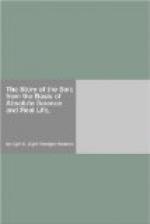“I think you are quite right in that,” said Mr. West. “Of course, it is important that every citizen entitled to the privilege of voting in a democracy like ours should be able to exercise his franchise intelligently; but the citizen who is responsible for the management of farm lands ought surely to be at least as well informed concerning the principles which underlie the maintenance of soil fertility; provided, of course, that such knowledge is within his reach; and from what you say I am beginning to believe that such is the case. At any rate this simple test seems to show conclusively that this soil contains no limestone, and it is common knowledge that limestone soils are good soils.”
Percy took up the ball of soil containing the slip of blue paper, broke it in two again, and it was seen that the paper had changed in color from blue to red
“There’s a change, for certain,” said Mr. West, “that has some meaning to you I suppose.”
“This is litmus paper,” said Percy. “It is prepared by moistening specially prepared paper with a solution of a coloring matter called litmus, and the paper is then dried. This coloring matter has the property of turning blue in the presence of alkali and red in the presence of acid. The blue paper is prepared with a trace of alkali, and the red paper with a trace of acid. If more than a trace were present the litmus paper would not be sufficiently sensitive for the test.
“This little bottle containing two dozen slips of paper cost me five cents, and it can be obtained at most drug stores.
“Alkali and acid are exactly opposite terms, like hot and cold. The one neutralizes the other. This test with litmus paper is a test for soil acidity, and the fact that the moisture of the soil has turned the litmus from blue to red shows that this soil is acid, or sour. The soil moisture contained enough acid to neutralize the trace of alkali contained in the blue paper and to change the paper to a distinctly light red color; and the fact that the paper remains red even after drying, shows that the soil contains fixed acids or acid salts, and not merely carbonic acid, which if present would completely volatilize as the paper dries.
“Now, these two tests are in harmony. The one shows the absence of limestone, and the other shows the presence of acidity, and consequently the need of limestone to correct or neutralize the acidity, for limestone itself is an alkali.”
“But limestone soils are not alkali soils, are they?” asked Mr. West.
“Not in the sense of containing injurious alkali, like sodium carbonate, the compound which is found in the ‘black alkali’ lands of the arid regions of the far West; but chemically considered limestone is truly an alkali; and, as such, it has power to neutralze this soil acidity.”
“Is the acidity harmful to the crops?”
“It is not particularly harmful to the common crops of the grass family, such as wheat, corn, oats, and timothy; but some of the most valuable crops for soil improvement will not thrive on acid soils. This is especially true of clover and alfalfa.”




